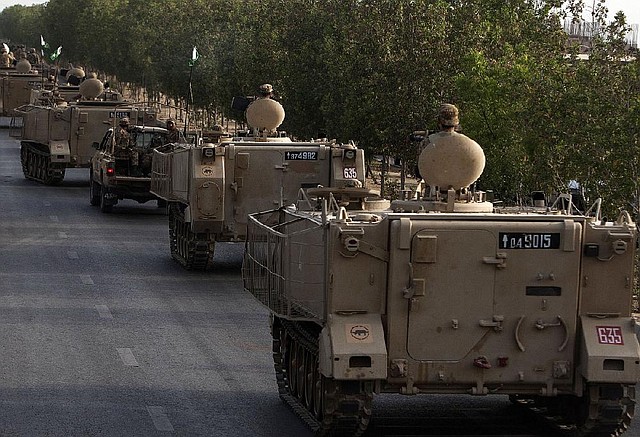Pakistan hits militant fighters
Prime minister says peace talks with Taliban closed
Tuesday, June 17, 2014
LONDON -- Pakistani fighter jets attacked Taliban strongholds Monday, and Islamist fighters retaliated with a roadside bombing, as a long-expected military operation in North Waziristan, the country's most lawless tribal district, moved into its second day.
The Pakistani military command said in a statement that it had attacked six targets in the district and killed 27 militant fighters. Most of the strikes occurred in the Shawal Valley, a thickly forested highland area that Taliban and al-Qaida fighters use as a sanctuary.
Several hours later, the military reported that at least six soldiers were killed when an explosion struck their convoy north of Miram Shah, the main town in North Waziristan.
The action Sunday and Monday, with a combined reported death toll of at least 167 people, suggested that the military's Waziristan campaign will initially be waged mainly from the air.
The military has said little else about the scope of the operation, except to note that artillery and ground troops will also be used. One official told Agence France-Presse that as many as 30,000 soldiers could be involved.
The military's casualty figures could not be independently confirmed because the tribal belt is inaccessible to outside journalists, and local journalists operate under considerable restrictions.
Pakistanis in the rest of the country are girding for possible reprisal attacks in major cities. Still, public opinion seems largely to support the operation, which the army calls Zarb-e-Azb, or Strike of the Prophet's Sword. "Operation at last!" read Monday's front-page headline in The Nation, a conservative English-language daily.
In a brief speech to the Pakistani parliament Monday, Prime Minister Nawaz Sharif tried to address speculation that there had been disagreement between his government and the military over the offensive. He called it a joint decision that became necessary after the Pakistani Taliban kept up a barrage of attacks during attempts to engage them in peace talks.
"We were talking to these groups and being attacked at the same time," he said.
Sharif recounted attacks on an Islamabad court and last week's siege of the Karachi airport, noting that Pakistani citizens no longer felt safe. He said his government was committed to restoring peace in Pakistan.
Sharif said that while there may have been different opinions about a military operation and peace negotiations in the past, "this chapter now has to be closed."
Sharif's main political rival, Imran Khan of the Pakistan Tehreek-e-Insaf party, has routinely criticized the Sharif administration for not being serious about negotiating with militant groups. However, television channels have reported that Khan's party would be backing the military operation.
Public opinion in Pakistan has long been divided on whether to try to end the Taliban insurgency through negotiations. But the militant attack on the Karachi airport last week, which killed at least 36 people and temporarily closed the airfield, has been seen as a humiliation and has galvanized opinion in favor of military action.
Even so, experts warn that the Taliban has a broad network of militant supporters, some of them in allied jihadist groups, which could be used to hit back.
On Monday in Multan, a city in Punjab province, unidentified gunmen abducted a nephew of the country's chief justice, police officials and family members said. There was no immediate claim of responsibility, and it was not clear whether the abduction was related to the North Waziristan offensive. But one of the victim's relatives, speaking on the condition of anonymity, said the missing man worked as a junior official at Inter-Services Intelligence, the country's powerful spy agency.
The army said Monday that it had blocked all entry points between North Waziristan and the rest of Pakistan and had requested assistance from the Afghan government in sealing North Waziristan's border with the Afghan province of Khost.
A Taliban commander, speaking by telephone from Waziristan, said surveillance drones were seen in the skies over the district, showing that the United States was helping Pakistan with its offensive.
"They are jointly conducting this operation against us, helping each other and sharing intelligence," he said.
The Pakistani army, however, has its own drones and recently started using them over Waziristan. Unlike some U.S. drones, the Pakistani drones carry no weapons.
The Taliban warned foreign companies and airlines to leave Pakistan or risk becoming targets in the conflict.
"They should immediately suspend their ongoing matters with Pakistan and prepare to leave Pakistan; otherwise they will be responsible for their own loss," a Taliban spokesman, Shahidullah Shahid, said in a statement.
Information for this article was contributed by Ihsanullah Tipu Mehsud of The New York Times.
A Section on 06/17/2014
